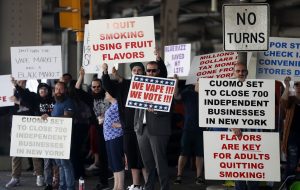 There have been a number of recent articles on the rapid spread of vaping-related illness. Here’s one that asks us to consider full legalization of cannabis products as a possible solution to the problem:
There have been a number of recent articles on the rapid spread of vaping-related illness. Here’s one that asks us to consider full legalization of cannabis products as a possible solution to the problem:
The vaping illness outbreak is strengthening the argument for legalizing marijuana
The reasoning is as follows: our current system of state laws and regulations around cannabis products is woefully inadequate, both in terms of design and enforcement. Can’t argue there. I’m less sure that Federal legalization and control is the fix. Federal agencies do have a lot of expertise and experience, but has it resulted in much past success? Think prescription painkillers, heroin, fentanyl, cocaine, methamphetamine, that “synthetic marijuana” junk…
We’re better as a nation at developing new drug problems than managing the existing ones.
By the way, the mysterious vaping illness now has a CDC-approved name. It’s E-cigarette or Vaping Associated Lung Injury (EVALI). I couldn’t help wondering why they hadn’t gone with E-cigarette or Vaping Injury to the Lungs (EVIL). But I’m sure the vape industry would protest. They’re already strongly opposed to most forms of regulation. I’ve seen photos of demonstrators carrying signs that read “I Vape and I Vote”.
Something I didn’t know that I learned from the article: “Dried herb typically contains 10 to 20 percent THC. THC vape oils can contain much more. “[They] typically have 70 to 90 percent THC…”
Do you find that scary? Imagine the tolerance someone would develop if they ingested that much THC on a daily basis. What kind of withdrawal syndrome would follow? What would happen to the risk of addiction — or if you prefer, a severe Cannabis Use Disorder. In fact, I’m wondering if vaping THC at those levels doesn’t represent a whole new form of substance disorder — not just an extension of the old.
Some questions I had as I read the article:
- Experience teaches that when an addictive substance is made legal, use increases. More people use more of the drug, more frequently. With cannabis in Colorado, there’s been a definite post-legalization upswing in the number of adult daily users. That’s also been our experience with legal substances such as alcohol and cigarettes. Countermeasures included taxation and age restrictions, but most kids still find a way to begin drinking and smoking well before they’re legally of age. Wouldn’t that continue after legalization?
- Suppose sales were restricted to vape cartridges in that 10-20% THC range. Wouldn’t that also boost black market sales of the more potent stuff? After all, there’s already a strong customer base. Plus black marketeers aren’t burdened with taxes, so their products would still be cheaper and perhaps stronger– among drug users, that’s usually a winning combo.
- I have more questions but in the interests of time, here’s one practical one: Given the current state of our national political process, would the Federal apparatus be more effective at monitoring and controlling cannabis than the states? Maybe in the best of times, but we don’t live in the best of times, politically speaking.
My observation: Legalization solves problems related to the legal status of a drug, but has far less impact on the problems related to the nature of the substance itself. Sometimes those even worsen.
Including misuse and abuse, dependence and addiction.
Anyway, looks to me like the Legalization Ship has sailed. It is what it is. Either way, we’ll have to live with the consequences, whatever they may turn out to be.










